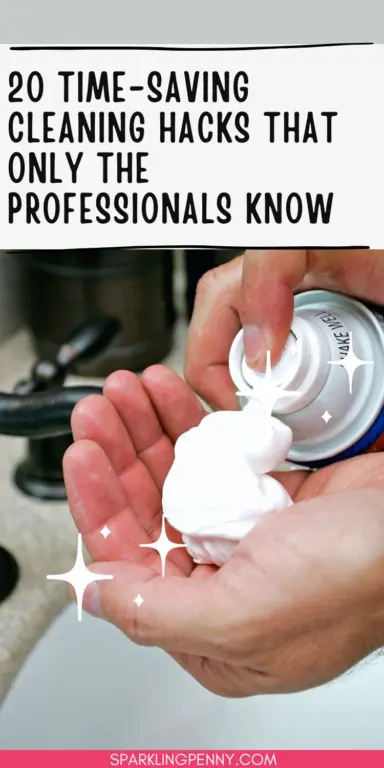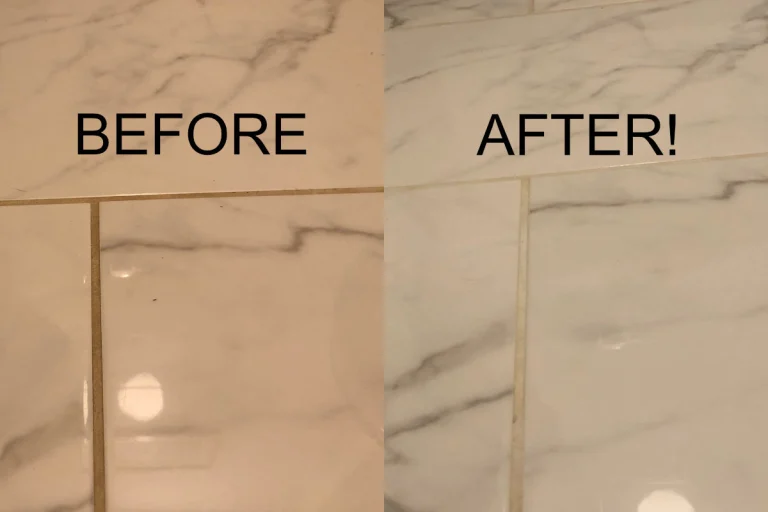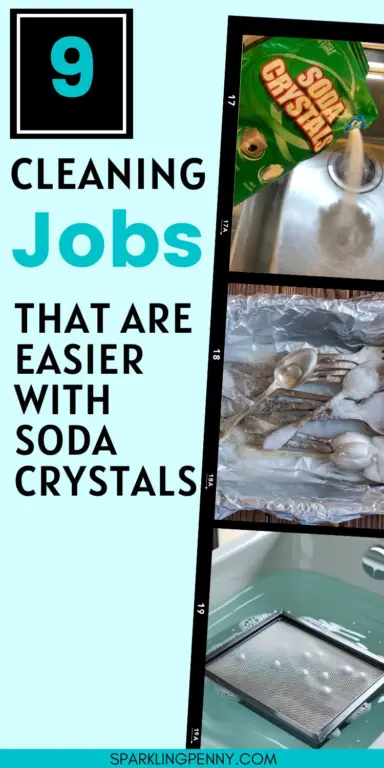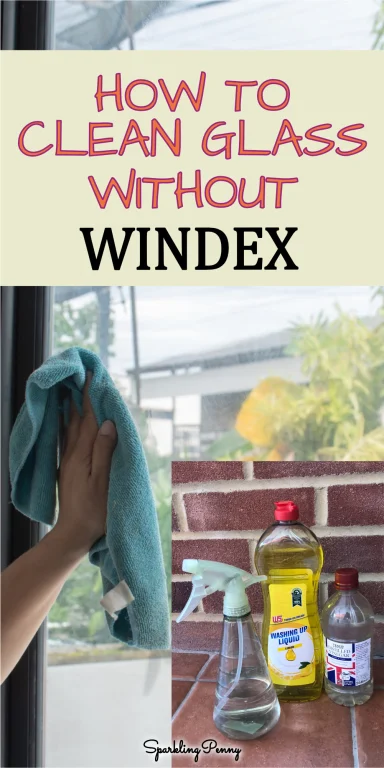Although washing dishes may not be the most exciting task, it is an essential one that we all have to do.
Whether you prefer to do it by hand or use a dishwasher, it’s important to have the right cleaning agents on hand to get the job done efficiently.
However, it can be frustrating when you run out of dish soap or dishwasher detergent, and have a pile of dishes to clean!
That’s why it’s helpful to know about alternative cleaning agents that you can use to keep your dishes clean and your home healthy.
In this post, I’ll share some other, but also effective, swaps, such as baking soda, washing soda crystals, distilled white vinegar, lemon juice, liquid Castile soap, and borax that you can use in place of traditional dish soap or dishwasher detergent.
These natural alternatives are often less expensive, easy to find, and safer for your family and the environment.
First off, let’s talk about the dishwasher.
Heads up: I sometimes use affiliate links. When you click these links and make a purchase, I may get a small commission. It won't cost you anything but it helps me to run this site.
Can you use laundry detergent in the dishwasher?
If you’ve run out of dishwasher detergent, you may be tempted to use laundry detergent as a substitute.
However, this is not recommended.
Laundry detergent is formulated differently from dishwasher detergent and can create suds in your dishwasher, which can lead to a mess and potentially damage your dishwasher.
Laundry detergent can also contain ingredients that are harmful to your dishwasher and dishes.
For example, it may contain bleach, which can damage your dishwasher’s plastic components and discolor your dishes.
Additionally, laundry detergent may contain fragrances or other chemicals that can leave a residue on your dishes, which can be harmful if ingested.
So, in summary, it’s best to stick to using dishwasher detergent in your dishwasher.
If you run out, you can use alternatives such as baking soda and borax, which are safe and effective for cleaning dishes in the dishwasher.
Let’s talk about those alternatives next.
What to use instead of dishwasher detergent

If you’ve run out of dishwasher detergent, don’t worry. There are alternatives that you can use to clean your dishes effectively.
These alternatives are also often less expensive than traditional dishwasher detergent and can be found in most grocery stores.
So, if you run out of dishwasher detergent, don’t panic, try one of these natural alternatives and keep your dishes clean and your home healthy.
Here are some safe and natural options for dishwasher detergent:
Baking Soda

Baking soda is a natural and effective cleaning agent that can be used to clean dishes in the dishwasher. It helps to break down grease and remove stains from your dishes, and it can also help to deodorize your dishwasher.
To use baking soda in the dishwasher, simply add a couple of tablespoons of baking soda to your dishwasher’s detergent compartment and run your dishwasher as usual.
You can also sprinkle baking soda on the bottom of your dishwasher before running a cycle for extra cleaning power.
Baking soda is affordable, easy to find in most grocery stores, and can be used in conjunction with other natural cleaning agents to keep your dishes clean and your home healthy.
Washing soda crystals
Washing soda crystals are another natural and effective alternative to traditional dishwasher detergents. They contain sodium carbonate, which helps to break down grease and remove stains from your dishes.
To use washing soda crystals in the dishwasher, simply add a tablespoon or two of soda crystals to your dishwasher’s detergent compartment and run your dishwasher as usual.
Borax

Borax is a natural laundry booster, but it can also be used in the dishwasher.
It’s effective at removing stains and grease from your dishes, and it can also help to deodorize your dishwasher.
To use borax in the dishwasher, simply add a couple of tablespoons of borax to your dishwasher’s detergent compartment and run your dishwasher as usual.
Borax is affordable, easy to find in most grocery stores, and can be used in conjunction with other natural cleaning agents to keep your dishes clean and your home healthy.
Distilled white vinegar
Distilled white vinegar is a natural and effective cleaning agent. It contains acetic acid, which helps to break down grease and remove stains from your dishes.
To use distilled white vinegar in the dishwasher, simply add a cup of vinegar to the top rack of your dishwasher and run your dishwasher as usual.
The vinegar will help to deodorize your dishwasher and leave your dishes sparkling clean.
You can also use distilled white vinegar as a natural rinse aid by adding it to your dishwasher’s rinse aid compartment.
Lemon Juice

Lemon juice contains citric acid, which helps to break down grease and remove stains from your dishes.
To use lemon juice in the dishwasher, simply add a cup of lemon juice to the top rack of your dishwasher and run your dishwasher as usual.
The lemon juice will help to deodorize your dishwasher and leave your dishes sparkling clean.
You can also use lemon juice as a natural rinse aid by adding it to your dishwasher’s rinse aid compartment.
Nothing
At a pinch, you can run your dishwasher without detergent.
However, I wouldn’t recommend doing this very often as it could cause grease to build up in your machine.
Here’s more on that – I forgot to put soap in the dishwasher, will it work?.
Can I use laundry detergent instead of dish soap?

If you’ve run out of your usual dish soap, you may be tempted to use laundry detergent as a substitute.
However, this is not recommended.
Laundry detergent is formulated differently from dish soap and can contain harsh chemicals that can be harmful if ingested.
Laundry detergent can also create too many suds, which can be difficult to rinse off your dishes.
This can leave a residue on your dishes that can be harmful if ingested.
Additionally, laundry detergent may contain fragrances or other chemicals that can be irritating to your skin if you are handwashing your dishes.
Here’s more on using laundry detergent instead of dish soap.
Let’s look at some great alternatives to traditional dish soap:
What to use instead dish soap

If you’ve run out of dishwashing liquid, don’t worry, there are alternatives that you can use to clean your dishes effectively.
These options are also often less expensive than traditional dishwashing liquid and can be found in most grocery stores.
So, if you run out of dishwashing liquid, don’t panic, try one of the following natural alternatives or use plain hot water to keep your dishes clean and your home healthy.
Baking soda
Baking soda, or bicarbonate of soda, is a natural and effective alternative to traditional dish soap. It can help to remove grease and stains from your dishes, and it’s safe to use on all types of dishware.
To use baking soda instead of dish soap, simply dissolve some in hot water.
Baking soda is also great for cleaning tough stains on pots and pans. Sprinkle some baking soda on the stain and add a little bit of water to create a paste.
Let the paste sit on the stain for a few minutes before scrubbing it off with a sponge or brush.
Washing soda crystals

Washing soda crystals are a natural and effective alternative to traditional dish soap. They contain sodium carbonate, which helps to break down grease and remove stains from your dishes.
To use soda crystals instead of dish soap, simply dissolve a couple of tablespoons in some hot water.
Like baking soda, washing soda crystals can also be used to clean tough stains on pots and pans. Sprinkle some crystals on the stain and add a little bit of water to create a paste.
Let the paste sit on the stain for a few minutes before scrubbing it off with a sponge or brush.
Distilled white vinegar
Distilled white vinegar is a natural and effective alternative to traditional dish soap. It contains acetic acid, which helps to break down grease and remove stains from your dishes.
To use distilled white vinegar instead of dish soap, simply add a cup of vinegar to a sink of warm water, or apply some vinegar onto your sponge or dish brush, and wash your dishes as usual.
The vinegar will also help to deodorize your dishware and remove any residual soap scum.
Liquid hand soap

Using liquid hand soap to clean dishes is a safe alternative when you run out of dish soap or want a more natural option.
Liquid hand soap is gentle on your hands and doesn’t contain harsh chemicals that can be harmful if ingested.
It’s important to note that not all hand soaps are suitable for dishwashing, so it’s best to choose an unscented, mild liquid hand soap that’s free from additives. Here’s more on that: can you use hand soap for dishwashing?
Simply add a small amount of the liquid hand soap to a sink of warm water and wash your dishes as usual.
Rinse thoroughly with clean water to remove any soap residue.
Liquid Castile soap
Liquid Castile soap is a natural and effective alternative to traditional dish soap. It’s made from vegetable oils, and it contains no harsh chemicals or synthetic fragrances.
To use liquid Castile soap instead of dish soap, simply add a small amount to a sink of warm water, or apply some soap onto your sponge or dish brush, and wash your dishes as usual.
Liquid Castile soap is gentle on your hands, and it’s safe to use on all types of dishware. It’s also great for cleaning other surfaces in your kitchen, such as countertops and appliances.
Bar soap

While it’s not recommended to use regular bar soap to wash dishes, there are bar soaps available that have been designed for use on dishes.
For example, an olive oil-based bar soap is a great option because it is gentle on the skin and effective at removing grease and grime from dishes.
To use bar soap to wash dishes, dissolve some in hot water, or rub some onto your cloth or washing-up brush.
Borax
Borax is a natural and effective alternative to traditional dish soap. It’s a naturally occurring mineral that helps to break down grease and remove stains from your dishes.
To use borax instead of dish soap, simply add a small amount to a sink of warm water, or sprinkle some borax onto your sponge or dish brush, and wash your dishes as usual.
Borax is also great for cleaning tough stains on pots and pans. Simply sprinkle some borax on the stain and add a little bit of water to create a paste. Let the paste sit on the stain for a few minutes before scrubbing it off with a sponge or brush.
Plain hot water
If you don’t have a lot of greasy pots and pans to wash, you can also use plain hot water to clean your dishes effectively.
Simply fill your sink with hot water and wash your dishes as usual.










